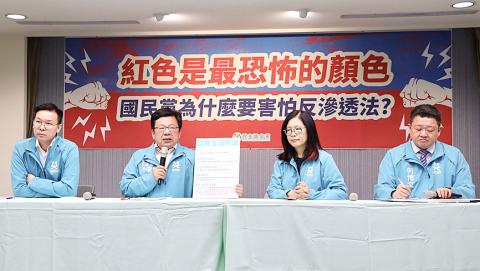The Democratic Progressive Party (DPP) yesterday criticized the Chinese Nationalist Party’s (KMT) opposition of its anti-infiltration bill, saying that the pan-blue camp’s stance on the issue runs against the international community’s mainstream consensus.
It has been well-established in Taiwan, as well as in the international community, that there is a need to protect democracy from infiltration by authoritarian powers, DPP Deputy Secretary-General Lin Fei-fan (林飛帆) told a news conference in Taipei.
However, the KMT has been opposing the DPP’s efforts to counter Chinese infiltration, he said.

Photo: CNA
While the DPP and the New Power Party have proposed three versions of anti-infiltration legislation since May, the KMT has not contributed any, Lin said.
If the KMT considers it important to fight infiltration, it should submit its own version, he said.
Retired lieutenant general Wu Sz-huai (吳斯懷), who is on the KMT’s list of legislator-at-large nominees, would have access to confidential national security information if the KMT garners more than 1.5 million votes in the Jan. 11 legislative election, he added.
Wu sparked controversy in 2016, when he attended a speech in Beijing by Chinese President Xi Jinping (習近平) and stood for a rendition of the Chinese national anthem.
The legislation would provide important protection for Taiwan’s democracy and would require support from all legislators across party lines, Lin said.
At planned cross-caucus negotiations, the DPP is to drop its proposal for the Legislative Yuan to enter a recess from Dec. 18, because a break could postpone reviews of the legislation if the KMT votes against it in today’s legislative session, DPP Legislator Kuan Bi-ling (管碧玲) said.
The DPP plans to propose at today’s session a second reading of its version of the legislation without going through committee review, she said.
Earlier yesterday, the Legislative Yuan’s Internal Administration Committee held a public hearing on the legislation.
National Policy Foundation adviser Charles Chen (陳以信), who is also on the KMT’s list of legislator-at-large nominees, said at the hearing that the DPP was attempting to force through its version of the bill.
As the Executive Yuan would be responsible for implementing the legislation if it becomes law, it should offer its opinion on the bill or submit its own version, he said.
KMT Central Policy Committee deputy director Wu Yu-sheng (吳育昇) said that the DPP’s version of the bill might infringe upon human rights and freedom of the press.
It is inappropriate for the ruling party to propose such a controversial law shortly before it could be voted out of power, he said.
Expedited passage of legislation does not mean the process was reckless, Chien Hsin University of Science and Technology Department of Business Administration professor Yen Chien-fa (顏建發) said, adding: “It is the content that matters.”
The bills address an urgent need to resist China’s interference in Taiwan’s elections, he said.
While they might not be perfect, it is important that the government have legislation in place to make people feel safe, he added.

NATIONAL SECURITY THREAT: An official said that Guan Guan’s comments had gone beyond the threshold of free speech, as she advocated for the destruction of the ROC China-born media influencer Guan Guan’s (關關) residency permit has been revoked for repeatedly posting pro-China content that threatens national security, the National Immigration Agency said yesterday. Guan Guan has said many controversial things in her videos posted to Douyin (抖音), including “the red flag will soon be painted all over Taiwan” and “Taiwan is an inseparable part of China,” while expressing hope for expedited “reunification.” The agency received multiple reports alleging that Guan Guan had advocated for armed reunification last year. After investigating, the agency last month issued a notice requiring her to appear and account for her actions. Guan Guan appeared as required,

Japan and the Philippines yesterday signed a defense pact that would allow the tax-free provision of ammunition, fuel, food and other necessities when their forces stage joint training to boost deterrence against China’s growing aggression in the region and to bolster their preparation for natural disasters. Japan has faced increasing political, trade and security tensions with China, which was angered by Japanese Prime Minister Sanae Takaichi’s remark that a Chinese attack on Taiwan would be a survival-threatening situation for Japan, triggering a military response. Japan and the Philippines have also had separate territorial conflicts with Beijing in the East and South China

A strong cold air mass is expected to arrive tonight, bringing a change in weather and a drop in temperature, the Central Weather Administration (CWA) said. The coldest time would be early on Thursday morning, with temperatures in some areas dipping as low as 8°C, it said. Daytime highs yesterday were 22°C to 24°C in northern and eastern Taiwan, and about 25°C to 28°C in the central and southern regions, it said. However, nighttime lows would dip to about 15°C to 16°C in central and northern Taiwan as well as the northeast, and 17°C to 19°C elsewhere, it said. Tropical Storm Nokaen, currently

PAPERS, PLEASE: The gang exploited the high value of the passports, selling them at inflated prices to Chinese buyers, who would treat them as ‘invisibility cloaks’ The Yilan District Court has handed four members of a syndicate prison terms ranging from one year and two months to two years and two months for their involvement in a scheme to purchase Taiwanese passports and resell them abroad at a massive markup. A Chinese human smuggling syndicate purchased Taiwanese passports through local criminal networks, exploiting the passports’ visa-free travel privileges to turn a profit of more than 20 times the original price, the court said. Such criminal organizations enable people to impersonate Taiwanese when entering and exiting Taiwan and other countries, undermining social order and the credibility of the nation’s